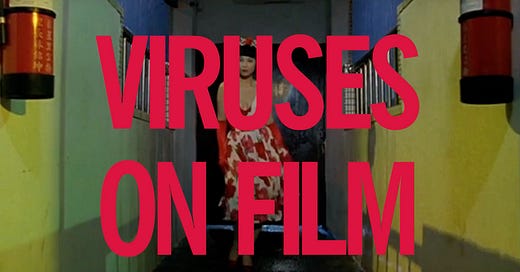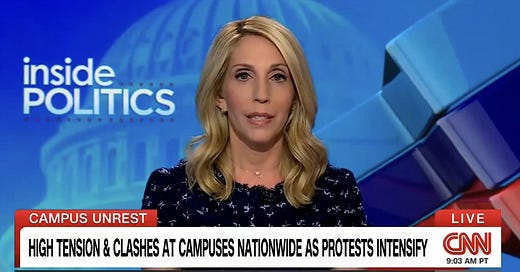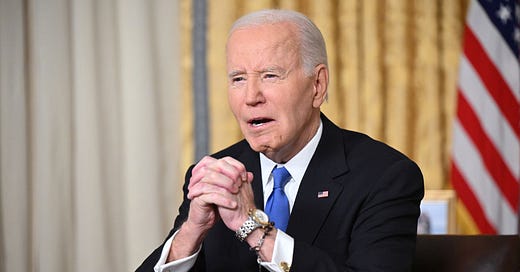
'Viruses on Film' Is Something You'll Actually Want to Catch
Talking with Steven Thrasher about his new BAM film festival.
Three years after COVID first landed, it might seem like the last thing anyone would want to do is think about viruses. But Viruses on Film, a series curated by friend of the blog Steven Thrasher that is screening at BAM in Brooklyn through March 23, asks us to take our blinders off. No matter how done we may feel with viruses, they are never done with us, and since the birth of cinema, the movies have been using them as a source of terror, a force that brings us together and flings us apart, and a metaphor for our societal pathologies.
Viruses on Film approaches its theme from a multitude of angles, from musicals to zombie horror to documentary to avant-garde auteurism and beyond, in an attempt to both suss out what our cinematic approach to viruses says about our world and to offer people a safe communal space to reflect on what viruses have put us all through in the past few years.
I spoke to Thrasher earlier this week about why he wanted to do the series, why he chose the films he did, and how it feels to be screening these movies in a world that seems desperate to shove viruses out of its mind. (And even if you’re not in New York, you can still get some good movie recommendations out of this chat!)
This interview has been condensed and edited.
I'm very intrigued by this film series. Could you give me some background on how it came together?
One of my first canceled appointments in the pandemic was with somebody at BAM. It was around this time three years ago. I had helped out with a couple of film festivals before, including a series they did on the complete works of Marlon Riggs, and I had always wanted to maybe curate a film festival—I went to film school as an undergrad.
The person that worked in film [at BAM], Janet Duncan, became the head of BAM around the time my book was coming out, and we reconnected. I said, you know, I think I would really like to do some kind of film series. She put me in touch with [BAM's film programming director] Jesse Trussell. He loved the idea.
In my book, The Viral Underclass, I referenced films a lot, and I've been super-interested in how the ways we narrate viruses affect the ways that we react to them. We're showing 17 features and three shorts, but I watched about 60 movies in planning it. I realized at a certain point when screening movies that these are the same movie structures across national borders. And I wanted to see how some of those movies hit emotionally now that everyone on Earth has been through a pandemic. And then I was also interested in seeing what other forms of cinema responded to epidemics—maybe more abstract or documentary or not in this straight-up genre. I became super-interested very quickly in how zombies genre very much overlap sometimes. Sometimes literally the inciting action in zombie movies is called a virus.
Probably the hardest part of it was trying to see how current cinema is dealing with it. And that's not much at all. We're showing a fantastic movie from Brazil, Follow the Protocol, that was made in quarantine lockdown. And we're showing the amazing Chinese documentary 76 Days. But given how Hollywood kept working through most of the pandemic, and how they had probably the strongest workplace protections—not altruistically, but because they cannot afford to stop shooting once they start shooting—there's actually very little reference to the pandemic in film or TV.
As you said, this series is landing at a very strange, interesting sort of time in terms of our relationship to viruses and the pandemic. We're right at the moment where the total privatization of the pandemic response is being initiated. COVID is now just another part of the pharma ad cycle. And in terms of movies or TV or popular culture in general, a sentiment that I have often heard and I'm sure have expressed one time or another is, "we don't want to watch a pandemic movie after all of this. We want everything to pretend like it never happened." How does it feel to be programming a series about viral outbreaks and the response to viruses at a moment when the drive to push viruses out of our minds is bigger than ever?
Part of the reason why I think I wanted to do it now is exactly for that reason—that there's a desire to push it away and pretend like it never happened. It gave me a way to keep thinking about viruses in a less head-on direction than I have with my book or my journalism. This time three years ago, in March of 2020, Contagion was a major, major film that people turned to.
Yeah, I remember very specifically being like, I'm not watching that right now.
I felt similar. I'm glad we're opening with it. It's not actually a movie that I love but I think that it's really important, and so I do want to think about, like, why was this the movie that people turned to? And to go back to something that you said, does it feel honest, having gone through this experience? Is it something that people want to think about or put out of their mind?
I actually predict that having looked at so many of these movies, I don't think we're going to see many more of them. I can't imagine wanting to greenlight a certain kind of disaster movie [about a] plague because it can't compete with the core of what's happened over the last three years. [If you watch] the show The Last of Us, which is technically about a fungus, not a virus, there's something that does ring really hollow in watching planes falling out of the sky and machine guns as a response to the pandemic, when the [real] pandemic was horrific, but not in those ways.
So I don't think that these kinds of movies are probably going to get made a lot more. But they're a huge part of our film background. And then leading into the movies that we did choose, there are all kinds of films that are actually quite outside of the genres but give a really honest depiction and hit emotionally and psychologically with the experiences we've gone through. So for me as a programmer and a viewer, and I hope for people who come to the series, I think one of the draws will be wanting to see depictions that help us process what's happened and what's still ongoing.
This desire to move on from what's happened is rooted in denying the loss of 1.1 million people and this massive collective grief. I've thought often about how in its most dangerous year, AIDS took 50,000 lives in the US, and we lost more than a million in about two-and-a-half years. The scale of collective grief that's being very much denied now is extremely painful and isolating. I'm hoping that some of these films will be a draw for people to see in community and process what they've gone through, and what we're still going through, and that it might be a point of conversation and potentially lead to ways of healing.
You said you watched 60 or so movies and you narrowed that down to 17. Was there a common thread within these specific movies that made you pick them out of the pile? And also, what were some of the movies that came close to making the cut but didn't?
I worked with Jesse Trussell, who's the senior film programmer at BAM, and it was fantastic working with him. He has an encyclopedic film knowledge. And we kind of thought of buckets or baskets or groups of films that we wanted to fill. So one was thinking about these pandemic procedurals [like Contagion]. We knew we wanted to have a certain number of documentaries. And I was very aware that I wanted this to be international. So we have 17 features, three shorts, and they're from 11 different countries.
We also knew that we want to have different viruses. So we have some that are [about] HIV, we have a beautiful documentary from Sierra Leone called Survivors about Ebola, we have Follow the Protocol, a Brazilian queer love story, and then also a documentary called Volunteer 1864 about people who went through blind drug trials in Brazil. We have 76 Days, a COVID documentary from China that's shot entirely in lockdown in Wuhan for 76 days, and watching it, you just can't believe that they got the footage they did.
We knew we want to have some fun as well, so we thought about sci-fi and things like that. We wanted to have some films that dealt with viruses in metaphorical ways. [In my book I have] an entire chapter on Parasite, and we knew we wanted to definitely program that to have a conversation about viruses and capitalism. We knew we wanted to have a computer virus movie. That's what Hackers is, another metaphor.
We talked a lot about the very close parallels between these pandemic thrillers and zombie movies, and so we knew that there was going to be some zombie representation. We're showing Train to Busan, a really great zombie movie that starts out with a fictional virus. And then we're also showing 28 Days Later, which begins with a lab experiment giving monkeys a virus they call “rage.”
I thought very seriously about having Dawn of the Dead, which is the second of the original zombie movies after Night of the Living Dead, [and is] very much about capitalism. I thought about having Cronenberg's Shivers, but it was too disgusting.
For some of the movies we chose, Follow the Protocol is one of my favorites. It's a Brazilian movie made all in the pandemic. It's starring and directed by Fabio Leal—I think it's his first feature. And he breaks up with his boyfriend in a very millennial-speak scene on Zoom, because Fabio's character refuses to break the protocol to go to his house. So they break up and then you see him alone. I was alone through most of the pandemic, and seeing the routines and things he was doing in that part registered as very honest to me in ways I hadn't seen represented. And then he decides he is going to have sex with people again, and it's extremely comical and hilarious. It really captures very well the value of intimacy and the desire for intimacy that was taken away. I wouldn't call it a silver lining, but one of the beautiful things that happened in this horrible experience, I think, collectively for the society, with being denied our ability to see each other, the value of it came into a very clear focus for many people and I think this film really shows that.
We're also showing two ACT UP films. United in Anger is a documentary about ACT UP here in New York, and then Beats Per Minute, a narrative movie about ACT UP Paris.
Two fantastic movies.
Two really great movies. And I also write briefly in my book about BPM. There's a scene where he's masturbating his friend—
Who's dying. Incredible scene.
It's a visual way of showing how gay people tried to give each other intimacy. And then the mourning scene after the death—I've gone through so many deaths and that just felt so much more honest than anything I've ever seen out of Hollywood. It really got to something emotionally true that you don't often see in cinema.
I love that movie so much. I think it's one of the best movies ever made.
I agree. Also, at a sort of technical level, I think that movie shows one of the huge differences between AIDS and a virus like the novel coronavirus. I think about these viruses in tandem, but they have very different mechanics. Particularly with documentaries made with respiratory viruses in pandemics, filmmakers are also in danger too, right? There's no sort of remove. So in [AIDS movies], the people who are not seriously sick, they're not going to get sick from interacting with people, right? [With] COVID, Ebola, yellow fever, the filmmakers themselves can be in great danger. That's particularly felt with a documentary we're showing called Survivors about the Ebola outbreak in Sierra Leone from 2014 to 2016. Ebola can have a 40, 50, 60, 70 percent death rate when [you're] exposed. But these filmmakers are riding in ambulances with people. They're very, very close to it. That was something we wanted to show—again, intimacy and how this plays out.
There's a movie I think you would particularly love, The Hole, which is so wonderful. It's made by a gay Taiwanese filmmaker, it came out in 1998. And it's very much a millennium anxiety movie.
Oh, this is the musical right? Yes, I'm very intrigued.
We don't want this to be all depressing. We want action movies, we want to find some comedy. The Hole is hilarious. It's a wonderful, very, very funny film. It really captures loneliness and desire for connection in a gorgeous, gorgeous way.
We were talking earlier about the resistance to grappling with viruses and pandemics that is in the air right now, for want of a better phrase. But listening to you talk about these movies, the sense that I get is that they offer a sort of cathartic experience and a way to access these buried emotions through an entertaining or accessible medium like a movie.
A lot of people [have] said they're interested in the series, but they're afraid of encountering some aspect of viruses, or the pandemic. But they want to see something and we'll direct them to lots of things. Like, oh you don't want to see a pandemic procedural? I totally understand it. They might be interested in this documentary. I think anyone could see Follow the Protocol without feeling wounded or hurt. It tugs at your heart as a love story. It ends in a really kind of beautiful, hopeful way, as a lot of these movies do. As horrible as these past three years have been, people need to laugh, and so I also wanted to use this series as a way to give people a sense of permission to laugh.
We're ending the series with like a film that I think is pretty brutal, but could be a good entry point for some people. It's called Blue, and it's made by the gay director Derek Jarman before he died of AIDS. This is the last movie he made. The screen visually is just a blue screen. You just see a blue screen through the whole thing and listen to a soundtrack, and it's because Jarman was losing his vision to CMV, cytomegalovirus, as AIDS destabilized his immune system, and he could only see the color blue. So it begins with a kind of description of losing his vision, and then it's like an audio play remembering different scenes in his life and times. It ends with him directing this color blue as the last color. It's really, really beautiful. I had written a story in The Village Voice 12 years ago about a gay couple that were both blind who lost their vision to CMV. And I asked them if they would come experience this movie and then be on the final panel with me and they agreed.
This film is so different from these Hollywood procedurals, and it's disorienting. What viruses do is disorienting. They fundamentally change our being, and sometimes they might change our senses and our perception of life. And I'm hoping that for sighted people, having the experience of not being able to see anything but one thing may give some insight into what the experience was like for people who actually had HIV.
These are very different kinds of movies. They range in terms of when they came out from 1964 up until the present day. I'm wondering if there's any throughlines you can see in terms of how they approached the idea of viruses or if there's been a lot of change between the movies at the chronological beginning of this series and the ones now.
There's one throughline that I've seen even going back before that to Jezebel with Bette Davis in the 1930s. The figure of the "patient zero" is very strong through all these movies. That's a phrase I don't use journalistically but I identify as what they're doing in these movies. The films are often set in an imagined ableist space that has no viruses, and it's always somebody from somewhere else coming into them that bring that brings them to town. It's like a person acting badly, and it's usually a woman who was sexually loose. The exception, where the phrase [patient zero] came from, is the flight attendant Gaetan Dugas wherever phrase came from, is the flight attendant who's so portrayed in And the Band Played On.
Right—completely inaccurately.
I watched the trailer for Jezebel, and they're saying, like, "a woman who was loved when she should have been whipped." [Ed note: this is 100 percent real.] She's sexually loose and then she dies of yellow fever. She brings the yellow fever with her sensuality and she dies of it. Jenny in Forrest Gump, she's out being loose, and they make her die of AIDS. Gwyneth Paltrow in Contagion comes from Hong Kong—she's in the "orient"—and then stops for a layover, pun intended, in Chicago, drops the virus off there, then goes on to Minneapolis and brings the virus there. So that's something that you see a lot throughout different countries, different decades, different continents. The virus is dramatized as spreading because somebody is behaving poorly. That's a pretty strong throughline.
You probably love all of these movies. But is there one in particular that has the warmest place in your heart?
The three are Follow the Protocol, The Hole, and Blue, but the warmest one is Follow the Protocol, I think, because it's only been shown once in the United States before, so I'm really happy to get to showcase it. [It's] one of the most honest ways I've ever seen bodies depicted. And I think that's very appropriate to having better ways to talk about viruses and sickness, you know, to just have a comfort with how bodies actually are. But also, just from a human standpoint, I think it's a gorgeous film. How vulnerable the characters are, how vulnerable the actors are, that allows for a certain kind of vulnerability on the part of the viewer to say, what's happened? What did I lose? What hurt me in these years? How was yearning? How can the vulnerability and the pain that I went through over these years be turned into something that could be a seed to grow into something better? So that's why I'd say it probably has the warmest place in my heart.

















